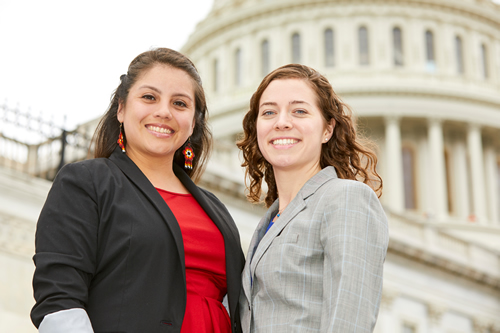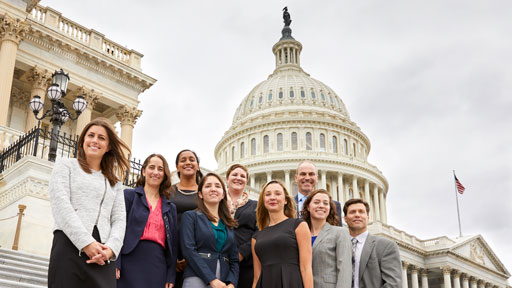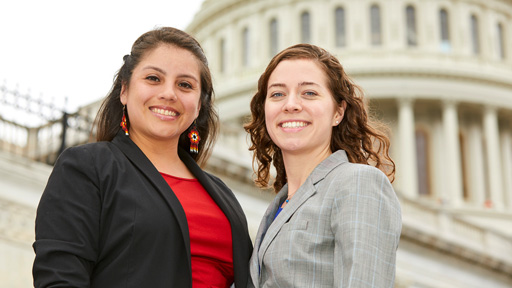NHGRI-ASHG fellowships fulfill critical need in science policy and education
Rapid advances in genomic research have led to a wealth of potential clinical applications that can benefit society. However, these new uses are being developed at a rate faster than policies can be formed or educational curriculums can be established.
A Pathway to Science Policy and Education Careers
One way to ensure that genomic discoveries in the lab drive policy and education for our benefit is to strengthen the workforce with people who can succeed at the interface between genomic research and science education and policy.
The National Human Genome Research Institute (NHGRI) and the American Society of Human Genetics (ASHG) have joined forces to provide a pathway for scientists who want to pursue careers in science policy or education. Their training programs - the Genetics and Public Policy Fellowship and the Genetics and Education Fellowship - offer effective experiences to those with graduate education in genetics (a masters or a Ph.D.) by embedding them in the public, private and non-profit arenas. The experience of this meaningful work helps build the skills required to inform policy and education within those realms.

These 16-month fellowships provide three different rotations: three to six months of experience working with ASHG in the non-profit sector; nine months as staff on Capitol Hill in Congress (policy), or six months at a public or private organization involved in genetics education, such as the Smithsonian Institution (education); and the first rotation, a four-month stint, that happens right here at NHGRI.
The 2016-2017 fellows, Christa Wagner, Ph.D. (policy), and Teresa Ramírez, Ph.D. (education), are just finishing their first rotation at NHGRI. We sat down with them to learn what they've accomplished.
What have you been working on since arriving at NHGRI?
Christa: During my rotation, I helped write the NHGRI Congressional Budget Justification for 2018. This is a portion of the National Institutes of Health document that is delivered to Congress that outlines the budget request for Fiscal Year 2018. It describes the institute's accomplishments and its goals for the upcoming years. My job was to write about one of NHGRI's programs called the Centers of Excellence in ELSI Research (CEER) program. This program funds researchers who are studying the bioethical implications of genomic research.
Teresa: My first rotation was in NHGRI's Education and Community Involvement Branch. I've been working on a project that involves building a partnership with Wheaton High School in Silver Spring, Maryland. We developed what's called a "Lunch and Learn," series, as well as a "Think Like a Scientist" series, where we invite speakers from NIH to come talk to the students about their research experience and the path they took to get there.
How has the fellowship changed what you thought about education or policy?
Teresa: The fellowship has provided more structure for how to bring the knowledge that I've obtained during my career as a scientist, and combine that with my passion for education. I think that having other colleagues who also are very passionate about giving back to the community has been one of the most wonderful and rewarding experiences I've had to date.
Christa: Being here, I'm starting to understand just how many people have an investment in the policies that are made. The wonderful thing about NHGRI is that you can see policy from many different perspectives: you have the academic grantees and government researchers; you also have people thinking about the legislation and how they can influence the decision-makers in Congress. It's the whole policy world in one space!
How does this fellowship serve a critical need in science education and policy?
Christa: I think this fellowship is a great way to pave the way for scientists to make it into the policy world. The fellowship teaches you to speak the policy-making language to complement the scientific skills you already have.
Teresa: The fellowship gives those who are interested in genetics and education the opportunity to explore this type of journey. The fellowship grants those who are heading towards the education route the opportunity to really engage - not only with the community, but also in curriculum, to figure out ways to improve the way science is taught, and find new initiatives and build partnerships.
What's the most interesting thing you did outside of the lab during your time as a graduate student?
Christa: I started competing in triathlons. I had been a competitive runner for a long time, but was looking to switch things up a bit and try something new!
Teresa: Learning how to dance Argentine tango! It was out of my comfort zone, but it really helped me become calmer during graduate school. It was like my yoga.
Who is your science idol?
Teresa: Dr. Alfredo Quiñones-Hinojosa. He is a role model of perseverance in science and medicine, from being a migrant farm worker to now being a renowned neurosurgeon and scientist. He is a true story of success who did not allow the circumstances or challenges to prevent him from becoming a physician-scientist and serving various communities.
Christa: Marie Curie. I admire a lot of women in science, but I think Marie Curie was one of the first female scientists I ever learned about. Her story is just full of curiosity-driven work, and she was especially impactful for the time in history when she was conducting her research.
Why do you "educate"?
Teresa: I educate because it's important to give students the opportunity to dream, to hope and to believe that they can also become a scientist, regardless of where they come from and regardless of their cultural background.
Why do you "policy"?
Christa: I think it's important having had science experience to bring that to the legislation-making process. I don't have to envision what's it's like to do bench science or see a patient, because I've done it. I want to be a bridge between scientists who know what the challenges and issues are, and the policy-makers who are actually writing the laws.
The application process for the 2017-2018 ASHG-NHGRI policy and education fellowships will open in late January. More information can be found on the NHGRI website for the policy fellowship and at for the education fellowship.
-
A Pathway to Science Policy an...
A Pathway to Science Policy and Education Careers
One way to ensure that genomic discoveries in the lab drive policy and education for our benefit is to strengthen the workforce with people who can succeed at the interface between genomic research and science education and policy.
The National Human Genome Research Institute (NHGRI) and the American Society of Human Genetics (ASHG) have joined forces to provide a pathway for scientists who want to pursue careers in science policy or education. Their training programs - the Genetics and Public Policy Fellowship and the Genetics and Education Fellowship - offer effective experiences to those with graduate education in genetics (a masters or a Ph.D.) by embedding them in the public, private and non-profit arenas. The experience of this meaningful work helps build the skills required to inform policy and education within those realms.

These 16-month fellowships provide three different rotations: three to six months of experience working with ASHG in the non-profit sector; nine months as staff on Capitol Hill in Congress (policy), or six months at a public or private organization involved in genetics education, such as the Smithsonian Institution (education); and the first rotation, a four-month stint, that happens right here at NHGRI.
The 2016-2017 fellows, Christa Wagner, Ph.D. (policy), and Teresa Ramírez, Ph.D. (education), are just finishing their first rotation at NHGRI. We sat down with them to learn what they've accomplished.
What have you been working on since arriving at NHGRI?
Christa: During my rotation, I helped write the NHGRI Congressional Budget Justification for 2018. This is a portion of the National Institutes of Health document that is delivered to Congress that outlines the budget request for Fiscal Year 2018. It describes the institute's accomplishments and its goals for the upcoming years. My job was to write about one of NHGRI's programs called the Centers of Excellence in ELSI Research (CEER) program. This program funds researchers who are studying the bioethical implications of genomic research.
Teresa: My first rotation was in NHGRI's Education and Community Involvement Branch. I've been working on a project that involves building a partnership with Wheaton High School in Silver Spring, Maryland. We developed what's called a "Lunch and Learn," series, as well as a "Think Like a Scientist" series, where we invite speakers from NIH to come talk to the students about their research experience and the path they took to get there.
How has the fellowship changed what you thought about education or policy?
Teresa: The fellowship has provided more structure for how to bring the knowledge that I've obtained during my career as a scientist, and combine that with my passion for education. I think that having other colleagues who also are very passionate about giving back to the community has been one of the most wonderful and rewarding experiences I've had to date.
Christa: Being here, I'm starting to understand just how many people have an investment in the policies that are made. The wonderful thing about NHGRI is that you can see policy from many different perspectives: you have the academic grantees and government researchers; you also have people thinking about the legislation and how they can influence the decision-makers in Congress. It's the whole policy world in one space!
How does this fellowship serve a critical need in science education and policy?
Christa: I think this fellowship is a great way to pave the way for scientists to make it into the policy world. The fellowship teaches you to speak the policy-making language to complement the scientific skills you already have.
Teresa: The fellowship gives those who are interested in genetics and education the opportunity to explore this type of journey. The fellowship grants those who are heading towards the education route the opportunity to really engage - not only with the community, but also in curriculum, to figure out ways to improve the way science is taught, and find new initiatives and build partnerships.
What's the most interesting thing you did outside of the lab during your time as a graduate student?
Christa: I started competing in triathlons. I had been a competitive runner for a long time, but was looking to switch things up a bit and try something new!
Teresa: Learning how to dance Argentine tango! It was out of my comfort zone, but it really helped me become calmer during graduate school. It was like my yoga.
Who is your science idol?
Teresa: Dr. Alfredo Quiñones-Hinojosa. He is a role model of perseverance in science and medicine, from being a migrant farm worker to now being a renowned neurosurgeon and scientist. He is a true story of success who did not allow the circumstances or challenges to prevent him from becoming a physician-scientist and serving various communities.
Christa: Marie Curie. I admire a lot of women in science, but I think Marie Curie was one of the first female scientists I ever learned about. Her story is just full of curiosity-driven work, and she was especially impactful for the time in history when she was conducting her research.
Why do you "educate"?
Teresa: I educate because it's important to give students the opportunity to dream, to hope and to believe that they can also become a scientist, regardless of where they come from and regardless of their cultural background.
Why do you "policy"?
Christa: I think it's important having had science experience to bring that to the legislation-making process. I don't have to envision what's it's like to do bench science or see a patient, because I've done it. I want to be a bridge between scientists who know what the challenges and issues are, and the policy-makers who are actually writing the laws.
The application process for the 2017-2018 ASHG-NHGRI policy and education fellowships will open in late January. More information can be found on the NHGRI website for the policy fellowship and at for the education fellowship.
Related Content
Last updated: September 17, 2015


